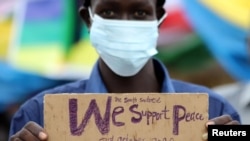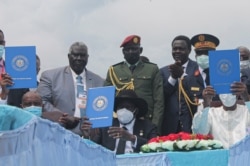Saturday’s peace deal between Sudan’s government and various rebel groups is drawing both praise and protests from the people most directly impacted by the accord.
Several Sudanese who attended a signing ceremony in Juba said the agreement marks a new beginning for the marginalized people of Sudan’s South Kordofan, Darfur and Blue Nile states.
Muteziem Adam, a resident of Blue Nile, said the agreement is especially important for internally displaced persons (IDPs) who have suffered for years without access to services like education or health care.
“Peace will make a good environment for the internally displaced persons and refugees in the neighboring countries to return back home and they can start local production that can improve our economy,” Adam told VOA’s South Sudan in Focus.
He also thought the agreement would improve Sudan’s relations with foreign countries and may even convince the U.S. to remove Sudan from its list of state sponsors of terror. If the U.S. lifts Sudan from the list, Adam believes, “we can start receiving support, especially financial support.”
Sudanese citizen Hassein Alfudul, who also attended the event, called on armed groups to respect the peace deal.
“This is a great achievement and we must respect and cooperate for its successful implementation. We should work hard until Sudan gets complete independence as well as development,” Alfudul told South Sudan in Focus.
Darfur protest
Not all Sudanese were pleased with the agreement. Hundreds of internally displaced persons (IDPs) living in camps in the western region of Darfur staged a peaceful protest while the event was happening on Saturday, chanting “no, no for Juba peace.”
In the Hujaj IDP camp in al-Genena town, IDP representative Mariam Adam Hussein called the signed agreement a “half peace deal.”
“We as IDPs and refugees’ women representatives assure the public that we are not part of this half peace. We believe this peace agreement doesn’t address the root causes of the IDPs and refugees. We didn’t nominate anyone from here to go and represent us in the Juba talks,” Hussein told protesters.
Women are still being targeted outside the camp when they leave to work on their farms or collect firewood, said Hussein. Since 2003, more than 300,000 women and girls have been raped and sexually assaulted and no one has been prosecuted, according to Hussein.
Mohammed Al Zain, who lives at the Abu Zer IDP camp, predicted the deal would collapse because some rebel groups in Darfur, South Kordofan and other parts of Sudan are still holding their guns and were not asked to participate in the talks.
“The Darfuri problem cannot be solved by excluding our people, who have been enduring suffering for more than 17 years. Thousands of our women [and] children are still suffering in refugee’s camps,” Zain told South Sudan in Focus.
Monsur Arbab Yunnis, chairman of the Justice and Equality rebel group, one of the holdouts, said the deal was dictated by a few groups who want to win positions in Sudan’s new government. Speaking to South Sudan in Focus via WhatsApp from Kampala, Uganda, Yunnis said elements from the previous regime of ousted president Omar al Bashir are playing out a political game.
“[The] Juba peace forum was illegitimate and a few groups decided to exclude others and give themselves the legitimate power to engage in absurd negotiations which lasted for one full year and they could not bring any fruitful and sustainable peace to Sudan,” Yunnis told VOA.
General Abdulfatah Al Burhan, who heads Sudan’s sovereign council, told the crowd in Juba that many Sudanese lost their loved ones in order to have lasting peace in their country and urged the holdout groups to join the peace process.
The Sudan Liberation Movement faction led by the Adbel Wahid Muhammed–Al Nur, and a faction of the Sudan People’s Liberation Movement North led by Abdallazi Al Hilu, did not sign the agreement, which includes protocols for security, land ownership and power sharing, but have agreed to continue negotiating with the government.
COVID guidelines ignored
Despite the coronavirus pandemic, thousands of people who gathered at Juba’s John Garang Mausoleum to witness the signing ceremony did not wear face masks or observe other social distancing guidelines. Some attendees even shook hands and hugged friends and relatives during the event.
Juba resident Taharir Chaplain said when there is peace, he is not afraid of a pandemic.
“If there’s peace even if corona is there, God’s will, even so I am not scared of anything, I just feel joy today,” Chaplain told South Sudan in Focus.
Sudanese citizen Musa Ibrahim, who wore a face mask, said it’s important for people to protect themselves and their loved ones by wearing masks every time they go outside. “There are some diseases that people can spread to others once they are infected. That is why it’s important for you to protect yourself by wearing a facemask and washing your hands with water and soap,” Ibrahim told VOA.






